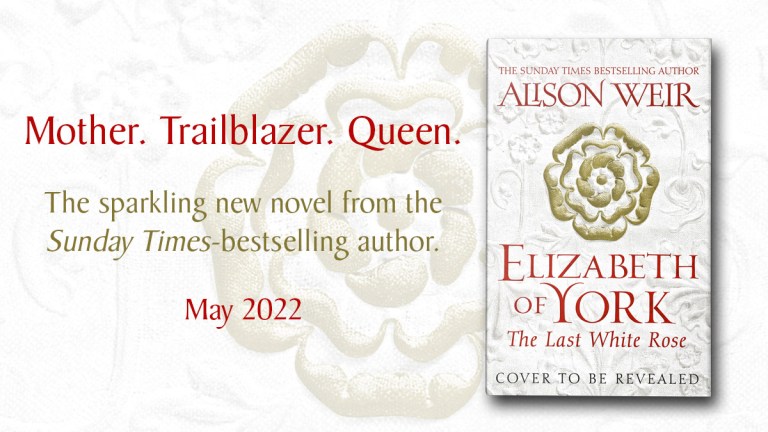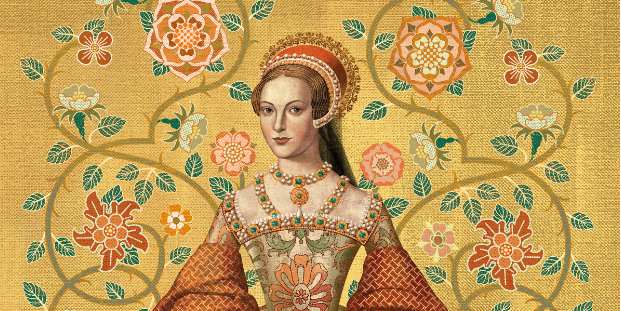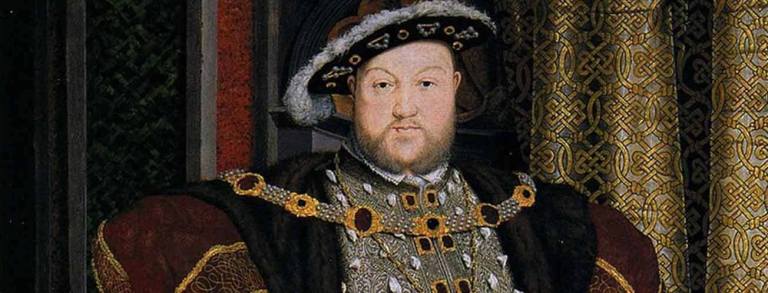A Man of God by Alison Weir

When writing this book, I was unable to use most of the vast amount of research I did on Katheryn Howard’s fall because it was written entirely from her viewpoint and she was kept very much in the dark about the investigations into her offences. In the novel, Katheryn never finds out who laid the information that led to her ruin.
This is what happened.
A MAN OF GOD
One bright afternoon late in October 1541, Archbishop Cranmer sat at the desk in his closet at Hampton Court Palace staring into space. He was reflecting on how God had brought him to this place, when, at the turning point all those years ago, he had been looking forward to a very different existence. He had been an idealist back then, having embraced the forbidden tenets of Lutheranism while still at Cambridge, like so many of his fellow students. He smiled faintly as he recalled Black Joan, the barmaid he had impulsively wed back in his riotous days, as he thought of them. He had spent the ensuing months regretting it, knowing that marriage was an insuperable bar to the career in the Church he had been contemplating. His problem had been solved when Joan died in childbirth with her infant. He had taken holy orders and embarked on a lifetime of study at Cambridge – or so he anticipated.
His career had taken a remarkable turn twelve years back, while he was staying near Waltham Abbey at the height of the controversy about the King’s Great Matter. A legatine court had just sat at Blackfriars to examine the legality of King Henry’s marriage to Katharine of Aragon; Henry wanted an annulment, but Katherine was resisting. The legate sent by the Pope had referred the case back to Rome, much to the King’s fury. The talk in the inns and taverns was of little else.
Cranmer was not even meant to have been staying at Waltham. He was on his way to Cambridge, but was warned not to go there because plague was rampant. At Waltham Abbey, he was offered a room at a guest house nearby and there, to his good cheer, he found two old friends who had been with him at university – Stephen Gardiner and Edward Fox. It was a merry reunion and Cranmer had found himself being treated to a good dinner.
Both his friends had done well for themselves and were now in the King’s service.
They had just returned from an abortive mission to Rome and were gloomily perplexed as to how the Great Matter could be resolved. After dinner, over a flagon of ale, they asked for Cranmer’s opinion.
‘You always were sound at theology,’ Foxe said.
‘I haven’t studied the matter in depth,’ he told them, ‘but, to my mind, this is not an issue for the Papal court; it should be judged by doctors of divinity in the universities. There is one truth in it, and the Scriptures will soon declare it if they are correctly interpreted by learned men trained for such a task. Taking this way, you might have made an end of the matter long since.’ Fateful words, for it was at this point that his life had changed.
Foxe and Gardiner had regarded him keenly. ‘You mean, Tom, that the case should be decided according to divine law, not canon law.’
‘Yes. The Pope’s intervention is not necessary. If the divines in the universities give it as their opinion that the King’s marriage is invalid, then invalid it must be, and all that is required is an official pronouncement by the Archbishop of Canterbury to that effect, leaving the King free to remarry.’
‘By God, his Grace must hear of this!’ Gardiner declared. And before Cranmer knew it, he was being whisked before the King, who listened to his proposal as if it were glad tidings from Heaven, then clapped him on the shoulder. ‘Dr Cranmer, you have the sow by the right ear!’ he had bellowed.
So the universities had been canvassed and, Cranmer suspected, hefty bribes had changed hands. But opinion had been divided and old Archbishop Warham had been decidedly reluctant to make any pronouncements on the case without Papal sanction.
Like everyone else in the world, Cranmer had been aware that the King was desperate to marry his sweetheart, Anne Boleyn. He had had no great opinion of her until he was placed in her father’s household as chaplain, at the King’s behest. There, he had been struck from the first by Anne’s zeal for reform. She and her family were passionate about it – so much so that he suspected that they were secret Lutherans like himself. A bond was formed between Cranmer and Anne: together, they would revolutionise religion in England.
When the King began the cumbersome and controversial process of severing the English Church from Rome, he relied heavily on Cranmer’s support. Cranmer had been at the very centre of affairs, leading anything but a quiet life of study. Nearly ten years ago, he had been sent to Nuremberg on an embassy to the Holy Roman Emperor. There, he had enjoyed meeting fellow reformers. One, the pastor Andreas Osiander, had a niece called Margarete, with whom Cranmer had instantly been smitten.
‘I would marry her, but I cannot, for I am in holy orders,’ he’d confided to Osiander.
‘Where in the Scriptures does it say that the clergy should be celibate?’ his friend replied. Cranmer had seen the sense in that. He had married Margarete, knowing that her must keep her existence a secret in England, because King Henry was firmly against the idea of those in holy orders taking wives. Margarete had had to be smuggled into the country in a travelling chest. He smiled at the memory, but the smile soon faded. She was back in Germany now, having fled there with their children two years ago when the King had begun to enforce the laws on celibacy, and he missed her. Until then, they had been discreet and untroubled by officialdom; looking back, Cranmer was in little doubt that the King had been aware of his domestic arrangements, but had turned a blind eye until he could do so no longer.
Just after his marriage, Archbishop Warham had died and King Henry had wasted no time in appointing Cranmer to the See of Canterbury; it was the highest office in the English Church, but Cranmer had known that he would have to tread warily. He was devoted heart and soul to the Lutheran faith, and his greatest desire was to advance it in England, but he had had to keep his views to himself, for the King would have regarded them as heretical, and the penalty for heresy was death by burning.
Almost as soon as he had been consecrated, he had annulled the King’s union with Katherine and confirmed the secret marriage Henry had entered into with Anne after discovering that she was pregnant; then he had crowned Anne. Three years later, he had voiced his belief that she was innocent of the charges of adultery laid against her, until the Privy Council had warned him off. It had hurt to declare the marriage he had worked so hard to bring about null and void. And he had wept when, two days later, she had gone to the scaffold, mourning not only his patroness, but also the blow her fall had dealt the cause of reform.
Yet he had bounced back. The following year, the King had named him godfather to Prince Edward, the long-awaited royal heir. Then the short reign of the child’s mother, Jane Seymour, the hope of the Catholics, had ended with her death in childbed. After that, Cranmer and his fellow reformers had steered the King towards an alliance with the Protestant German princes. That had been a disaster from the moment Henry set eyes on Anne of Cleves. Cranmer had had to break that marriage too, in the dismal knowledge that Norfolk and Gardiner, stout Catholics both, had pushed Norfolk’s niece into Henry’s path and the King had taken the bait. Not that Cranmer had anything against Katheryn Howard personally. She was a pretty, kind and virtuous young girl, even if queenship had gone somewhat to her head. It was what she represented that he deplored. While the conservatives were in the ascendant, the cause of reform could never be advanced.
He sighed. The King was veering ever closer towards traditional religion. Gardiner and his cronies had got to him. But now he was on progress in the north, receiving the submission of the multitudes who had rebelled against his reforms by rising in the Pilgrimage of Grace, which he had ruthlessly suppressed. Cranmer had been left behind with other Privy Councillors to deal with affairs of state in the King’s absence. Most were ardent reformers, like himself. They had sat in council many times now and deplored the conservatives’ attempts to put the clock back.
He glanced at the clock on the mantel. It would soon be time for them to meet again. He picked up his pen and signed the letter he had been writing before he’d begun reminiscing. At that moment, the door opened and his clerk came in.
‘A gentleman is asking to see your Grace – a Mr Lascelles.’
Cranmer knew of John Lascelles. An ardent reformer, he served in the King’s Privy Chamber and was spoken of as a man of principle. Cranmer had inwardly applauded last year when Lascelles had openly called Gardiner and Norfolk obstacles to further reform who were standing manifestly against God and their Prince.
‘Send him in,’ he said.
Lascelles was tall and lean-faced, and there was about him an air of zealotry. Cranmer greeted him with a smile and asked him to be seated, wondering what this was about.
‘It’s about the Queen, your Grace.’
Cranmer raised his eyebrows.
Lascelles looked him unwaveringly in the eyes. ‘I feel it my duty to report something that has come to my knowledge. I have taken advice on this from a friend and we both think it would be high treason not to reveal such a matter immediately.’
Cranmer was suddenly riveted. What on earth was the man talking about?
‘You had done well to come to me,’ he said. ‘Pray proceed.’
Lascelles barely drew breath. ’Before she married, my sister Mary was a servant of the old Duchess of Norfolk who brought up the Queen. Because she was an old acquaintance, I recommended her to seek service with her Grace when she married the King. She said she would not, but that she was very sorry for the Queen. I asked her why, and she told me that her Grace was of light morals.’
Something stirred in Cranmer, but he did not interrupt his visitor.
‘She told me,’ Lascelles continued, ‘that one Francis Dereham, who was also a servant in my lady of Norfolk’s house, had lain in bed with Mistress Katheryn Howard, as she then was, between the sheets, on a hundred nights, and there was such puffing and blowing between them that a maid who slept in the same dorter told Mistress Katheryn that she would never again share a bed with her because she knew not what marriage was.’
‘Your sister is certain of these things?’ Cranmer asked. ‘Of the seriousness of her allegations?’
‘She is a godly woman and would never bear false witness. You can question her yourself.’ Lascelles leaned forward. ‘Dereham was not the Queen’s only lover. My sister told me that one Manox, who taught her Grace music, knew a private mark on her body. Another maid told Mary that Manox was betrothed to Mistress Katheryn Howard, with whom he was much in love. It was commonly believed in the Duchess’s household that Manox was troth-plight to her. My sister told me that she wondered at the King taking for his Queen one who had lived so wantonly before marriage. She said she was sorry for it and lamented that the King’s Majesty had married Mistress Katheryn.’
Cranmer was thinking rapidly. Betrothed? Troth-plight? Was the King’s marriage actually valid? Exhilaration was building in him. God truly did work in mysterious ways.
‘Your sister never confided these things to you before?’ he asked.
‘No, your Grace.’ Lascelles looked worried, as well he might. Concealing such matters might be construed as misprision of treason – if there was any treason. It might just be a simple case of annulling the marriage. Young people were often ignorant – and foolish.
‘I wonder what prompted her to reveal these things to you now,’ Cranmer said.
‘She has been on the brink of saying something for a long time, but a lady in the Queen’s household recently wrote to say that her Grace had accepted Dereham into her service, and Mary was worried about that. She felt she ought to say something.’
This was getting better and better. Cranmer saw instantly why the woman was worried. For what reason would the Queen employ her former lover, unless it was to rekindle their relations? In which case, it would not be just wantonness, but adultery – and adultery in a queen was treason. If that were the case, and Lascelles’s sister had known of the earlier connection between them, she could be in very serious trouble indeed.
‘I am astonished to hear that her Grace is not a woman of such purity as is esteemed,’ he said. ‘This must be investigated further.’ A great opportunity had just been delivered into his hands and he was determined to take full advantage or it. If there had been a precontract between the Queen and Manox, or with Dereham, it would be possible to unseat her and discredit the Catholic party. The way would then be clear for the King to marry a bride put forward by Cranmer and his fellow reformists, a bride who would hopefully be as energetic as Anne Boleyn in the cause of true religion. It was not mere luck that the councillors who had been left behind at Hampton Court were of the same persuasion as Cranmer: it was God’s providence. They would know what needed to be done.
He thanked Lascelles for coming to see him and sent him away. Then he sat for a while, thinking deeply. He could find no reason to fault Mrs Hall’s testimony. And he was duty-bound to report what he had heard.
Fornication before marriage was not a crime, but it argued a lightness of morals that might well alienate the King, who rejoiced in his wife’s purity. Yet Cranmer knew he was treading on very dangerous ground. Henry was deeply in love with Katheryn Howard and likely to react violently to any implication that she was not as virtuous as he believed. Cranmer knew it would be wise to consult his fellow councillors, considering the weight and importance of the matter.
He sought out the Lord Chancellor and the Earl of Hertford and spoke to them in private. He watched as they weighed the matter, clearly aware of its gravity.
‘This troubles me greatly,’ the Lord Chancellor said, shaking his head.
‘It leaves me much disquieted,’ Hertford chimed in. ‘What is your Grace’s view?’
He had anticipated that they would bat the ball back in his court. ‘My lords, I think I know the King well enough to predict that he will sacrifice his personal feelings in the interests of his realm. He will be devastated by this news, but he will not be made a fool of. And I know you will agree with me when I say that the wedded happiness of one man can weigh little against the salvation of millions of souls.’
‘Your Grace has hit the nub of it,’ Hertford observed.
The Lord Chancellor looked at Cranmer. ‘I think that you should reveal this information to the King’s Majesty.‘
‘I agree,’ Hertford concurred.
‘Leave it with me,’ Cranmer said, and returned to his closet feeling sick with sorrow for the King, whose joy was about to be brutally extinguished. But, if there was a canker in the body politic, it must be rooted out. It was best to distance your emotions – and your finer self – from distasteful practicalities. Even so, he could not find in his heart to repeat that damning testimony to the King’s face. So he wrote it in a letter, most sorrowfully, as he hoped he had made clear, and sealed it. Next to the seal, he added a note recommending that his Grace read it in private.
The next day was the feast of All Saints. During the celebration of Mass for the dead, when the King and Queen were offering at the altar, Cranmer crept into the royal pew and left the letter on his Majesty’s chair. Then he returned to his chamber and waited, dread and excitement mounting within him.
'This six-book series looks likely to become a landmark in historical fiction' THE TIMES
'With characteristic verve and stunning period detail, this novel will captivate you and break your heart. Utterly sublime' TRACY BORMAN
Alison Weir, historian and author of the Sunday Times-bestselling Six Tudor Queens series, relates one of the most tragic stories in English history: Katheryn Howard, Henry VIII's fifth queen.
'Conveys the heart-rending pathos of a young woman executed, whose only real crime was her naïveté and her desire to be loved... It is a profoundly moving story that lingers long after the last page is turned'
ELIZABETH FREMANTLE
'Alison's sensitively drawn novel will change everyone's preconceptions'
SUSAN RONALD
...
A NAIVE YOUNG WOMAN AT THE MERCY OF HER AMBITIOUS FAMILY.
At just nineteen, Katheryn Howard is quick to trust and fall in love.
She comes to court. She sings, she dances. She captures the heart of the King.
But Henry knows nothing of Katheryn's past - one that comes back increasingly to haunt her. For those who share her secrets are waiting in the shadows, whispering words of love... and blackmail.
The fifth of Henry's queens.
Her story.
Acclaimed, bestselling historian Alison Weir draws on extensive research to recount the tale of a vivacious young woman used by powerful men for their own gain.
HISTORY TELLS US SHE DIED TOO SOON.
THIS MESMERISING NOVEL BRINGS HER TO LIFE.
PRAISE FOR THE SIX TUDOR QUEENS SERIES:
'Weir is excellent on the little details that bring a world to life' Guardian
'Alison Weir makes history come alive as no one else' Barbara Erskine
'Well researched and engrossing' Good Housekeeping
'Utterly gripping and endlessly surprising' Tracy Borman
'Hugely enjoyable . . . Alison Weir knows her subject and has a knack for the telling and textural detail' Daily Mail







